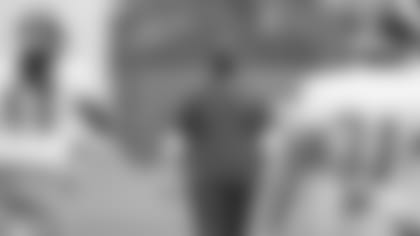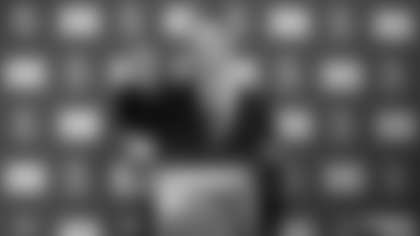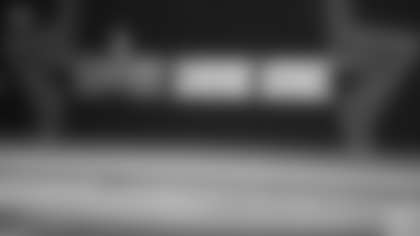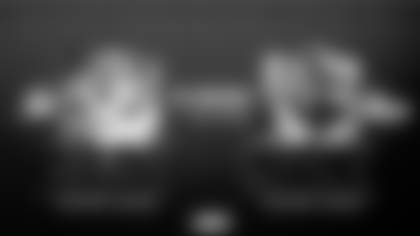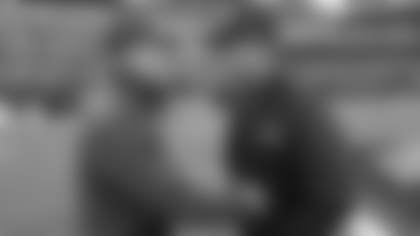EAST RUTHERFORD, N.J. – A familiar soundtrack returned to the Giants' practice today as the players wore full equipment for the first time. The thud of shoulder pads energized players and coaches and served as a reminder the NFL season begins in less than a month.
"It definitely brings some more juice to the practice," wide receiver Sterling Shepard said on a post-practice Zoom call. "Guys haven't been in pads since the last game of last season. Some of us were very excited about it. I know the coaches were fired up about it. It's always like going to the first day of class. Guys were amped up in the locker room about it."
"It was great," running back Saquon Barkley said. "Any time you are able to go out there and you are presented with an opportunity to play the sport that you love you have to go try and take advantage of it. We got to put on pads for the first time in a while. Any time you get that and the pads get popping, everyone is definitely eager to get out there. It's another day, another day at work, another day to get better. Another day to try to improve, and I think we were able to do that today."
But this first class represented more than just another day. Shepard, Barkley and the remainder of the holdover Giants have a new group of instructors in coach Joe Judge and his staff. And they have brought to the team a new way to do business.
Three noticeable changes in Judge's practices: no names on the backs of jerseys, penalty laps and two 11-on-11 groups work simultaneously, which is vital when padded workouts have an NFL-mandated limit of 90 minutes.
"We're moving at a rapid speed," Shepard said. "Some of the drills are two-spotted so that we can get more reps. It just moves a lot quicker."
"The way to expand that time is to expand the drills you're running and make sure everyone is working at all times," Judge said. "Our coaches have done a good job of organizing the morning and talking to players about where they're going throughout the practice. We have a lot of moving parts, but our players understand that there's a purpose in everything we're doing. We're trying to make sure everybody maximizes the time on the field, maximizes our reps, and gives us a chance to evaluate everybody, and for them to improve on their individual techniques.
"The benefit of having two different groups mirror the script for each other is we don't just get to watch one group run a certain play and a player learns off of somebody else's mistake. They all get to watch the tape and see themselves doing the exact same play as somebody else, see the differences and how they execute it. Maybe the other player executed it in what worked better for us. Then as coaches, it gives us just a better opportunity to see everybody play as much ball as we can. … We maximize the reps and fly around and get as much as we can. The theory is we want to get everybody as much reps as we can so we can evaluate the team, and everyone can work as much as they can to improve."
With so many footballs getting snapped at the same time, Judge would benefit from having an extra set of eyes – say in the back of his head. But he has become adept at monitoring a sizeable percentage of the practice action.
"Early in practice, I know the drills going on, I know what we're installing that day," he said. "I want to see certain guys and what they are working fundamentally on. I want to see certain position groups schematically and how they are building in the daily install. Early in practice I know exactly where I'm going. As we get into the team periods, I know the plays I really want to see with each group based on who a certain matchup may be. I kind of earmark certain plays where I may work back and forth between field one and field two or either drill. When we get to one spot there is not much of need to float anywhere because everything is in one spot. When we are going two spots though I just want to make sure I am conscious of everything going on. A day like today when we are all on the same field, it's easy for me to stand at midfield turn one way and watch an offensive play, turn around the other way and watch the same offensive play going in the other direction. We try to vary the snaps a little on the timing of it so that two plays aren't running exactly consecutive. It gives us a chance to see both plays."
Judge explained his reasoning for removing the names after a reporter's follow-up question.
"To be honest with you," he said, "I've been places where we've gone an entire offseason without numbers. To me, it's important to know who the players are on the field across from you by their body type and how they move, more so than having to see a nameplate to identify your teammate. We should know each other as coaches and players by how we move and the way we carry ourselves.
"When a quarterback gets under center, I expect him to know, is that a safety in the box or a Will linebacker? I expect them to know, is that a sized defensive end on the outside or is that an outside linebacker walked up? The numbers and name stuff, we'll do that on game day. Right now, we have numbers just to meet the rules laid out by the league. But to be honest with you, the identification of who the players are, we should be better than that as coaches and players by knowing our teammates."
Moments later Judge offered a specific explanation how jersey names and numbers are incidental on the practice field.
"It's important to know who the person across from you is by how they move," Judge said. "If you're a corner or a safety and you're playing man coverage on a wide receiver, you have to know who they are by skill set. You don't just say someone is a wide receiver and they line up out there and they're the same carbon copy person as the other one in line. Everybody is different, everybody is unique. You have to understand what someone's strengths are, what their weaknesses are, and what your own strengths and weaknesses are. Every time you match up, it's a different situation, different scenario, and it ties into who the people are, more so than what the scheme is."
Practice mistakes – such as mental errors or careless penalties – are met not just with constructive criticism and high volume from the coaches, but also a run around the perimeter of the field.
"There are consequences on the field for making mistakes," Judge said. "In a game, it'll cost you five, 10 or 15 yards. In practice, there needs to be consequences so we learn how to deal with our mistakes."
The players know that in order to avoid conditioning as punishment, they must be more attentive and precise in practice.
"We're focusing on being a detailed team and holding each other accountable," running back Barkley said. "The little things matter and that comes with the territory."
It certainly does when Judge is presiding over it.
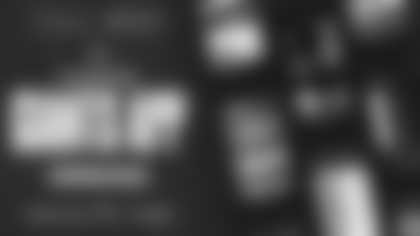
Giants App
Download the Giants' official app for iPhone, iPad and Android devices


